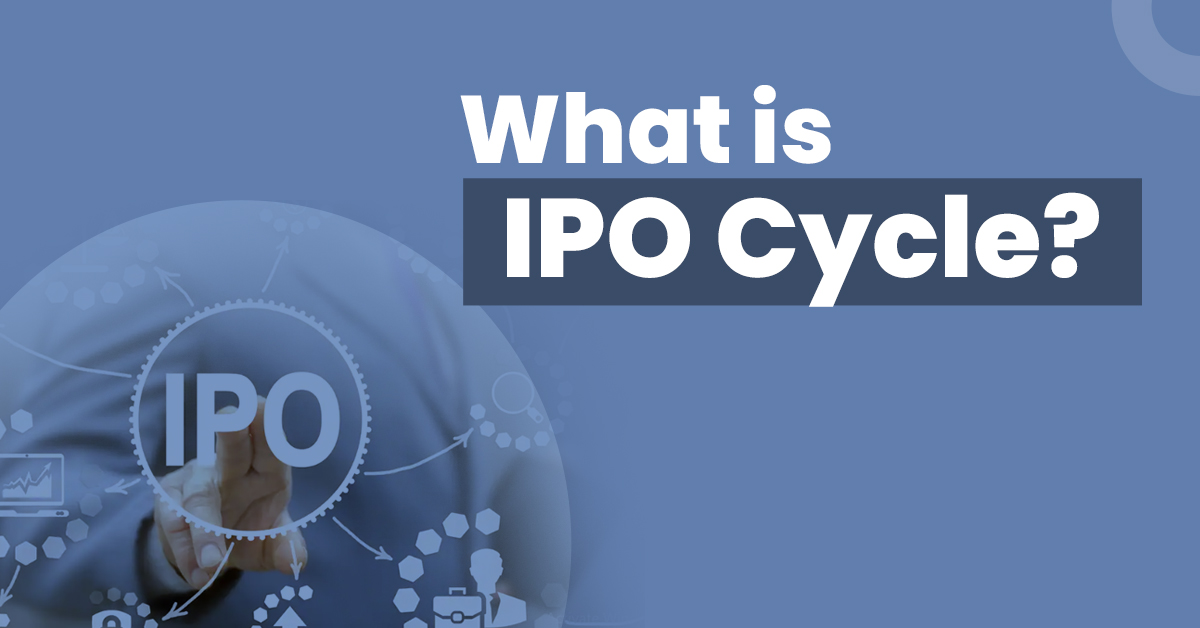What Is an IPO Cycle? – Meaning and Different Stages


A company can raise funds in two ways. It can either offer its shares to the public or take loans in the form of various fixed-income instruments. The method of selling a company’s stock and raising required funds by going public is known as the initial public offering (IPO). In this regard, an IPO cycle refers to the entire process of formulation of a plan to get the public right to the allotment of shares to investors.
Let’s know more about the different stages of an IPO cycle.
What Is an IPO?
As mentioned above, an Initial Public Offering (IPO) is a way by which a private limited company or firm transforms into a public limited company by offering its share to the public for the first time.
After the launch of an IPO, a company gets listed on stock exchanges. India’s capital markets regulator i.e., the Securities and Exchange Board of India regulates the entire process of launching an IPO. Under this, the company has the right to allot shares on a first come first serve basis, lottery basis or pro rata basis to prospective investors.
Now that you are aware of the meaning of IPO, it’s time to move to the other dimensions of this concept including the IPO cycle.
What Is an IPO Cycle?
The entire process of launching an initial public offering and allotting shares to investors is an IPO cycle. There are various steps that lead to a successful listing of a company in the secondary market. Initially, companies will have to file DRHP or draft a red herring prospectus with SEBI. This is a booklet that defines the objective of launching this IPO, and what the company intends to do with raised funds.
Once they have hired an investment banker, successfully filed the DRHP, and SEBI has approved the same, they can move on to the next step. It involves getting in touch with an investment bank which does all research-related work and offers advice on how a company should move ahead with its launch.
These banks serve as an underwriter for the IPO issue. Moreover, it is also necessary for a company to take the services of a corporate lawyer who will deal with legal compliances.
What Are the Different Stages of an IPO Cycle?
The different stages relating to an IPO cycle in India are as follows:
Consulting an Investment Banker
First, companies seeking to launch their IPO should hire an investment banker to work as an underwriter. They will conduct internal and external market research to understand market functioning and the company’s fundamentals like assets and liabilities. The banker and company sign an underwriting agreement which contains all the necessary details.
Preparing DRHP
After receiving approval from SEBI, the company has to prepare a Draft Red Herring Prospectus (DRHP) and submit it to SEBI. It includes all information about the company such as its financial details, management details, the estimated price range of IPO, industry and business description and location of plants and offices. It is also made available to investors to gain a better understanding of the business.
Registration with SEBI
After finalising basic details with the investment banker, the company needs to submit a registration statement to SEBI. It will contain all the information regarding the financial status of the company and the objective of raising such funds.
SEBI will examine this statement and grant their approval or disapproval. Only after SEBI’s approval can the company move ahead with the next step.
Roadshows
In order to make an IPO successful, companies need to nurture potential investors’ interest. For this purpose, the company’s management and sometimes their hired investment bankers carry out roadshows throughout the country. They undertake frequent visits to commercial hubs and target HNIs, sophisticated investors, corporate houses, etc.
It is a marketing tool to attract investors by making them aware of the company’s business plans.
Price Band
The company provides a tentative price range in its red herring prospectus. They announce their final price band after getting all the necessary approvals from SEBI.
After fixing price bands, the company formally announces the IPO issue price for investors. In some cases, the company may also announce the price band later after the subscription.
If a company decides to announce the price later, it is known as the book-building method. The price is determined after consulting with investment bankers and underwriters.
IPO Opening for the Public
After determining the size of the IPO issue and price range for the same, the company decides the date for the launch of the IPO. On this date, many prospective investors take part in the bidding process for buying shares of the company.
Share Allotment
After investors put up their bids, and the company analyses them, it proceeds with the share allotment process. Usually, companies in consultation with the respective investment bankers, decide on the allotment on a proportionate basis.
Listing
This is the final stage in an IPO cycle. It happens after the completion of bidding and subsequent allocation of shares. These shares get transferred to the concerned Demat accounts of the investors. In case any investor has not been allotted shares, their money gets refunded.
Final Word
An IPO cycle is a complex and time-consuming process including many technicalities and formalities. Companies looking to launch an IPO should conduct a thorough analysis of the market and gauge investor sentiments before going ahead with such a rigorous exercise.
Frequently Asked Questions
What are the benefits of an initial public offering?
Launching an Initial Public Offering (IPO) is one of the most secure ways of raising funds for a company. Businesses get funds from a diversified pool of investors which also leads to increased company visibility and awareness among the masses.
What are the cons of an IPO cycle?
Companies going through a rigorous IPO process incur huge costs in terms of consulting fees for investment bankers and legal and compliance fees that they need to pay to regulatory authorities. Moreover, it is a very time-consuming process which leads to several non-monetary costs as well.
Who regulates IPO cycles in India?
The capital markets regulator i.e., the Securities and Exchange Board of India (SEBI) is responsible for regulating the IPO cycles of companies.
What is a Draft Red Herring Prospectus (DRHP)?
This is a statement or document that companies prepare to introduce their business models to prospective investors. The main idea behind this document is to attract the target audience i.e., small and large investors, by communicating the business vision.



